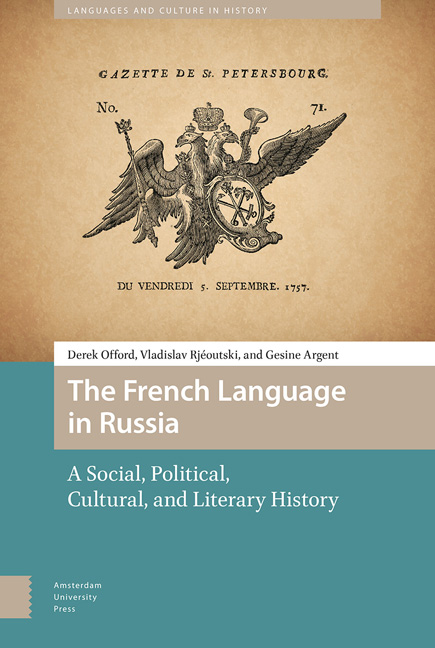Book contents
- Frontmatter
- Contents
- List of illustrations
- Preface
- Acknowledgements
- Presentation of Dates, Transliteration, and other Editorial Practices
- The Romanovs
- Introduction
- Chapter 1 The historical contexts of Russian francophonie
- Chapter 2 Teaching and learning French
- Chapter 3 French at court
- Chapter 4 French in high society
- Chapter 5 French in diplomacy and other official domains
- Chapter 6 Writing French
- Chapter 7 French for cultural propaganda and political polemics
- Chapter 8 Language attitudes
- Chapter 9 Perceptions of bilingualism in the classical Russian novel
- Conclusion The functions of French in imperial Russia
- Bibliography
- Index
- Languages and Culture in History
Conclusion - The functions of French in imperial Russia
Published online by Cambridge University Press: 16 February 2021
- Frontmatter
- Contents
- List of illustrations
- Preface
- Acknowledgements
- Presentation of Dates, Transliteration, and other Editorial Practices
- The Romanovs
- Introduction
- Chapter 1 The historical contexts of Russian francophonie
- Chapter 2 Teaching and learning French
- Chapter 3 French at court
- Chapter 4 French in high society
- Chapter 5 French in diplomacy and other official domains
- Chapter 6 Writing French
- Chapter 7 French for cultural propaganda and political polemics
- Chapter 8 Language attitudes
- Chapter 9 Perceptions of bilingualism in the classical Russian novel
- Conclusion The functions of French in imperial Russia
- Bibliography
- Index
- Languages and Culture in History
Summary
We have sought in this book to illustrate the multiple functions of the French language in Russia more thoroughly than we think has previously been done in a single work. Broadly speaking, French – that is, the standardized variety of the French elite – was an instrument which helped to bring Russia much closer to Europe. It was a lingua franca through which Russians could engage in the eighteenth and nineteenth centuries with the world beyond the borders of their empire. Mastery of it helped them to absorb Europe’s knowledge, enjoy its artistic culture, follow its fashions, partake of its material comforts, and become acquainted with its intellectual achievements. A collection of French books was a staple element in a well-stocked noble library. It may have been particularly convenient for Russians sometimes to use French when discussing certain subjects, such as medicine, political affairs, and some cultural matters, and not only when foreigners who had no Russian were present. This was because texts that underpinned knowledge in many fields, from architecture to fashion, were written in French, or had been translated into French, which thus served as a vehicular language, and because French provided the lexicon with which to pursue the subject, at least until expertise in it had been acquired in Russia. French was also becoming the predominant diplomatic language in eighteenth-century Europe. Knowledge of it thus furthered the grand strategic aim of Russia’s eighteenth-century sovereigns to enter the European geopolitical arena and, indeed, to assert their new power on the international stage. French was a court language too: courtiers’ command of it added lustre to the image of Russia abroad, for the prestige of a great power was bound up with the impression made on foreign visitors by life at its court. It was a royal language, inasmuch as it was associated with the royal family. It was an imperial language as well, insofar as it served as a lingua franca among ethnically diverse elements of Russia's social, military, and civilian administrative elite.
For the nobility in particular, French had numerous functions. On a relatively trivial level, it could be used as a secret language, in which speakers might discuss plans, opinions, and disputes without fear of being understood by their domestic servants or other social inferiors.
- Type
- Chapter
- Information
- The French Language in RussiaA Social, Political, Cultural, and Literary History, pp. 571 - 588Publisher: Amsterdam University PressPrint publication year: 2018



